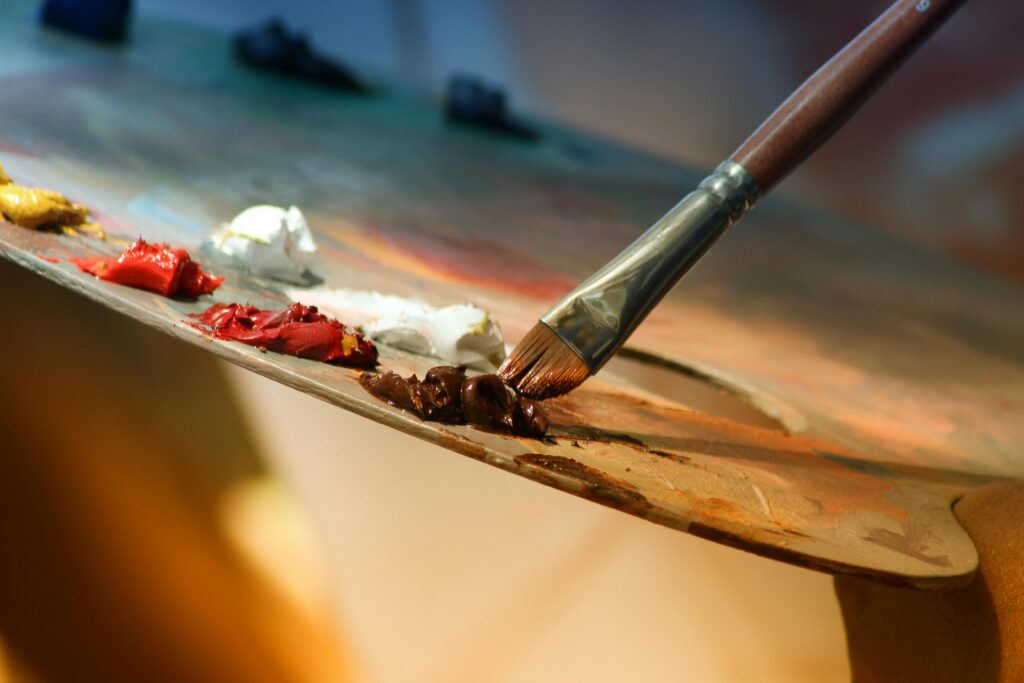Understanding Art Therapy
How can creative expression facilitate healing in the context of addiction recovery? Art therapy serves as a profound tool for individuals maneuvering the complexities of addiction. Rooted in art therapy principles, this therapeutic approach leverages the creative process to reveal emotional insights and nurture self-discovery. By engaging in artistic activities, clients can express feelings that may be difficult to articulate verbally, providing a safe outlet for emotions. Clients often experience catharsis as they create, leading to increased self-awareness and empowerment. The tangible results of their efforts reflect their internal struggles, making them easier to process and understand. Ultimately, art therapy is not solely about the finished product; it emphasizes the journey of creation, cultivating a meaningful connection between the individual and their healing process. By integrating art into addiction recovery, individuals can initiate a transformative path toward emotional well-being.
Benefits of Art Therapy
Harnessing creativity in art therapy offers many benefits for individuals in addiction recovery. One of its significant advantages is the provision of creative outlets, allowing for the safe exploration of emotions difficult to verbalize, thus increasing self-awareness and insight. Art therapy promotes relaxation and reduces anxiety associated with recovery. Engaging in artistic activities can facilitate a state of mindfulness, helping individuals focus on the present moment. Additionally, the communal aspect of group art therapy can improve social connections and support, further aiding recovery. Explore more about our mental health treatment programs that integrate such creative therapies in New Jersey.
Overall, art therapy offers a holistic method for healing, enriching the addiction recovery journey through creativity. Artistic engagement nurtures a sense of accomplishment and boosts self-esteem. Completing a project instills pride, reinforcing that recovery is within reach.
Techniques for Emotional Expression
Through various techniques, art therapy provides powerful avenues for emotional expression, helping those in recovery communicate feelings in unique ways. Collage creation encourages self-reflection and reveals subconscious emotions, facilitating discussions about their significance. Painting emotions allows individuals to translate feelings onto canvas using colors and forms, offering therapeutic release. Clients gain insights into their emotional environment, promoting healing and self-awareness.
Integrating these techniques can improve emotional literacy, empower articulation of feelings, and establish a sense of freedom. Such interactions offer a safe space for exploration, facilitating healing and supporting sustained recovery.
Integrating Art Therapy in Recovery
Integrating art therapy into recovery offers a holistic approach addressing both emotional and psychological needs. Utilizing artistic mediums like painting and drawing, individuals express feelings that may be difficult to articulate verbally. Art therapy nurtures a sense of safety in therapeutic environments, empowering exploration of emotions and past experiences, encouraging self-discovery and personal growth.
Participants often feel relief after engaging with different mediums, externalizing inner turmoil. Incorporating art therapy fosters social interaction and community, strengthening bonds among participants, creating a supportive recovery network. Learn more about our comprehensive substance abuse treatment services available in New Jersey.

Final Thoughts
Art therapy is a necessary component in addiction recovery, offering a unique avenue for emotional expression and healing. Facilitating creative engagement allows individuals to navigate complex feelings and experiences in a supportive environment. The transformative nature of art nurtures self-discovery, improves emotional literacy, and strengthens community bonds. As addiction recovery continues to evolve, integrating art therapy into treatment regimens presents a promising pathway toward holistic healing and lasting personal growth.
If you or someone you care about is struggling with substance abuse, remember that help is readily available. At BlueCrest Health Group, we offer comprehensive substance abuse treatment tailored to meet individual needs, fostering recovery and hope. Our team of dedicated professionals is committed to providing the support, guidance, and resources necessary to navigate the journey to sobriety. Follow us on Facebook for more insights and support as you embark on this path to recovery.
Frequently Asked Questions
Can Anyone Participate in Art Therapy, Regardless of Artistic Skill?
Yes, anyone can participate in art therapy, regardless of artistic skill. The focus is on creative exploration and emotional release, allowing individuals to express feelings and experiences in a supportive environment that nurtures healing and personal growth.
Are There Specific Art Materials Recommended for Beginners?
For beginners in art therapy, recommended materials include acrylic paints, which are bright and easy to use, and colored pencils, which offer precision and control. These tools facilitate creative exploration and emotional expression.
How Long Does a Typical Art Therapy Session Last?
A typical art therapy session lasts between 60 to 90 minutes. This session allows clients to explore their emotions deeply, maximizing therapeutic benefits and nurturing a conducive environment for personal expression and healing.
Can Art Therapy Be Conducted Online or Remotely?
Art therapy can be effectively conducted online, utilizing virtual art platforms to facilitate remote engagement. This approach allows for creative expression while maintaining therapeutic connections, broadening access for individuals seeking emotional support from diverse locations.
Do Health Insurance Plans cover Art Therapy?
Insurance coverage for art therapy varies significantly among health plans. Many policies recognize therapy benefits for mental health treatment, but specific inclusion of art therapy may require verification with individual insurance providers for coverage details.

